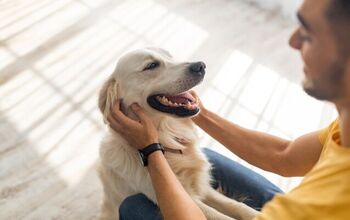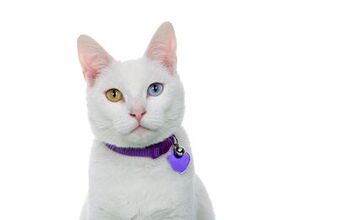How Acupuncture Can Help Cats and Dogs

Acupuncture is a part of Traditional Chinese Medicine (TCM), and it can be used on people and pets to address a range of conditions. By balancing the flow of energy in the body, this technique can help reduce or resolve symptoms in a natural way.
Many people have used acupuncture for their pets and achieved incredible results. But, like anything else, it might not be right for all pets or all conditions. And working with a qualified veterinarian who’s certified in pet acupuncture is key.
Read on to learn more about acupuncture for cats and dogs.
What Is Acupuncture for Dogs and Cats?
In acupuncture, fine needles are placed in the skin on certain points throughout the body, referred to as acupuncture points or acupoints, in order to do things like restore energetic balance, reduce pain and inflammation, and support healthy blood flow. Based on your pet’s symptoms and condition, an acupuncturist will know where to insert the needles to get positive results.
The needles shouldn’t cause any discomfort for your pet. In fact, pet parents often state that their animals become relaxed during their acupuncture sessions.
Types of Pet Acupuncture
There are a few types of pet acupuncture, and an acupuncturist will determine which is best for your dog or cat.
Dry needle acupuncture is the type of acupuncture that you’re likely familiar with. However, instead of using needles, acupuncturists can simply apply pressure to specific points on a pet’s body to support healing—this is known as acupressure.
Other options include electroacupuncture, which combines the use of needles with an electric current, and laser acupuncture, which uses a cold laser to stimulate acupuncture points.
The Benefits of Acupuncture for Pets
Acupuncture can provide a host of benefits to pets when done correctly and by the right professional. As always, it’s wise to discuss this healing technique with your veterinarian to figure out if it’s appropriate for your canine or feline. And it’s important to discuss the potential risks or drawbacks before deciding if you want to try it.
Some of the conditions that may be treated with the help of acupuncture include:
- Arthritis and joint problems
Acupuncture can be used to help relieve discomfort and pain associated with various conditions. If your pet has been diagnosed with arthritis or hip dysplasia, if they’ve been injured and are dealing with pain, or even if they’re having pain after a procedure, acupuncture might be a good treatment for reducing inflammation and improving mobility.
In addition to acupuncture treatments, you can also help your pet feel more comfortable by using a heated bed like the K&H Thermo-Snuggle Cup Heated Cat Bed, which can also work well for small dogs. This product is machine washable and features soft fleece that your companion will love snuggling into. Its circular shape ensures your furry friend will feel nice and secure. Plus, you can use the removable heater to help alleviate discomfort and keep them warm while they relax or nap.
- Digestive issues
If your dog or cat has been experiencing digestive problems like diarrhea, constipation, nausea, or vomiting, it’s important to have them examined by a veterinarian to figure out the cause, as these symptoms are associated with multiple health problems, such as pancreatitis and irritable bowel disease (IBD).
By boosting circulation and supporting the entire digestive system, acupuncture can be a natural approach to improving your pet’s digestion. So, once you have a diagnosis, acupuncture might be recommended by your veterinarian in addition to other treatment options, such as prebiotics, probiotics, digestive enzymes, and medications. For example, products like Bark & Whiskers Complete Probiotics—which contains 14 strains of beneficial bacteria for dogs and cats—can be added to your pet’s food easily to give them a daily dose of probiotics that support digestion.
- Skin ailments
Various skin conditions can affect canines and felines, leading to symptoms like itchiness, irritation, fur loss, and more. Left untreated, the skin problems can worsen and lead to other issues like self-inflicted wounds from excessive scratching, bald spots from excessive licking, and infections.
If your pet is exhibiting symptoms, have a veterinarian examine them to figure out what’s going on (e.g., fungal infection, bacterial infection, parasites, allergy, stress, etc.), as you’ll need to know the cause in order to provide the right treatment. Depending on the cause, acupuncture might be a useful tool to provide relief.
- Neurological problems
Your veterinarian might recommend acupuncture in combination with other treatments if your pet has been diagnosed with a neurological problem like epilepsy. This treatment might even help restore function in pets who are paralyzed.
Several stories of paralyzed pets regaining use of their legs with the help of acupuncture can be found online and on social media. Pretzel the cat is one example of a paralyzed cat that benefitted from acupuncture, and Talleyrand the kitten is another example of what’s possible with electroacupuncture.
- Behavioral problems
It’s unnerving when your pet is exhibiting behavioral problems or changes in behavior and you don’t know why. In the same way that you’d need to have a veterinarian diagnose a physical problem, you need to figure out what’s behind your companion’s behavioral issues. Whether your dog or cat is excessively vocalizing, pacing, overgrooming, etc., it might be a good idea to add acupuncture to their treatment plan.
Acupuncture can help dogs and cats feel calmer and more at ease. So, it could be an option for pets who experience anxiety, fear, stress, and sadness, as well as other imbalances that lead to behavioral problems or make your pet feel unhappy or insecure. You might also consider working with a pet behaviorist, in addition to consulting a veterinarian, to come up with ways to support your furry friend’s emotional and mental well-being on a daily basis.
- Respiratory issues
If your pet is experiencing respiratory symptoms, such as coughing or trouble breathing, consult your veterinarian. Asthma and chronic allergic bronchitis are examples of the conditions that could be treated with the help of acupuncture, and it might also be useful if your pet has been diagnosed with a sinus infection or upper respiratory infection.
As is the case with other conditions, acupuncture can be used with other treatments to provide relief. Because of its anti-inflammatory effects, it may help your pet feel better sooner, so it’s worth discussing your companion’s condition with an acupuncturist.
- Cancer
Cancer treatments for pets can cause side effects, and acupuncture might help tackle those side effects to help your dog or cat feel better. In addition to relaxing your pet and reducing inflammation, acupuncture treatments might also help reduce pain and nausea.
Pets undergoing cancer treatment might also suffer from a reduced appetite. Acupuncture might be useful by helping to ensure they’re able to eat enough food to fight the cancer and heal.
A Complement to Your Veterinarian’s Treatment Plan
There are a lot of reasons to consider acupuncture for your pet. This natural healing modality can be used in combination with other holistic treatments and conventional veterinary medicine to support your companion’s healing. It typically doesn’t cause pain, and your vet can choose the type of acupuncture that’s right for your furry friend. Plus, you might even be able to find a certified veterinary acupuncturist who will provide this treatment in your home to make the experience even more relaxing for your dog or cat.
Join the PetGuide community. Get the latest pet news and product recommendations by subscribing to our newsletter here.

Lisa Selvaggio is a freelance writer and editor, and our resident cats-pert, with certifications in pet nutrition and pet first aid. She enjoys producing content that helps people understand animals better so they can give their pets a safe and happy home.
More by Lisa Selvaggio

























